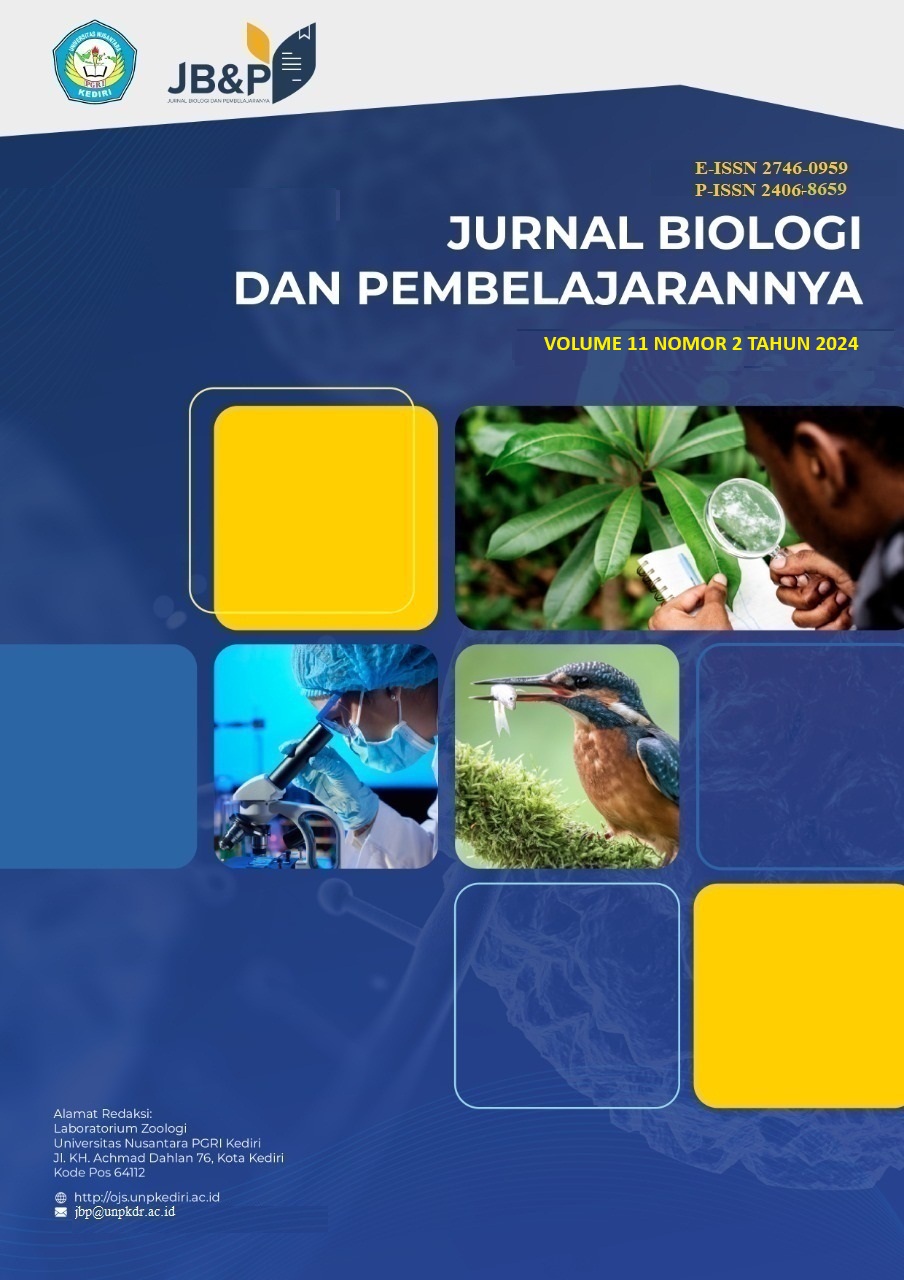Pengembangan E-LKPD Interaktif Berbasis Games Berbantuan Website Wizer.me pada Materi Sistem Pencernaan Manusia
DOI:
https://doi.org/10.29407/jbp.v11i2.23933Keywords:
E-LKPD, games, Wizer.meAbstract
Interactive e-LKPD based on games assisted by the Wizer.me website has never been developed by educators in schools. Interactive e-LKPD based on games assisted by the Wizer.me website is thought to increase students' motivation to learn. The purpose of the study was to produce interactive e-LKPD based on games assisted by the Wizer.me website on the human digestive system material. The type of research is development research with the Thiagarajan development model consisting of define, design, develop, and disseminate. However, this study is limited to the develop stage. The research instruments are a needs analysis questionnaire, an evaluation expert validation questionnaire, and a learning media expert validation questionnaire. Interactive e-LKPD based on games assisted by the Wizer.me website on the human digestive system material is declared very valid and feasible in terms of evaluation questions (98%) and learning media (97%). Interactive e-LKPD based on games assisted by the Wizer.me website can be recommended as one of the tools to develop student skills, especially Generation Z where teachers can create more interesting and dynamic learning experiences through the use of technology and digital tools.
References
Abdullah, A. A., Ahid, N., Fawzi, T., & Muhtadin, M. A. (2023). Peran Guru dalam Pengembangan Kurikulum Pembelajaran. TSAQOFAH, 3(1), 23-38. https://doi.org/10.58578/tsaqofah.v3i1.732
Andriyani, N. L., & Suniasih, N. W. (2021). Development of Learning Videos Based on Problem-Solving Characteristics of Animals and Their Habitats Contain in Ipa Subjects on 6th-Grade. Journal of Education Technology, 5(1), 37–47. https://doi.org/10.23887/jet.v5i1.32314
Ardana Yasa, I. K. D. C., Agung, A. A. G., & Simamora, A. H. (2021). Meningkatkan Semangat Belajar Siswa Melalui Multimedia Interaktif Pada Mata Pelajaran IPA. Jurnal Edutech Undiksha, 8(1), 104–112. https://doi.org/10.23887/jeu.v9i1.32523
Bate’e, A. K., Derana Laoli, J., Dohona, S., & Lase, W. (2023). Penerapan Metode Permainan untuk Meningkatkan Minat Belajar Siswa Sekolah Dasar. Conference of Elementary Studies, 46-53. https://journal.um-surabaya.ac.id/Pro/article/view/19713
Dewi, N. A., Purnamasari, R., & Karmila, N. (2023). Pengembangan E-Lkpd Berbasis Webiste Wizer.me Materi Sifat-Sifat Bangun Ruang. Didaktik : Jurnal Ilmiah PGSD STKIP Subang, 9(2), 2562 - 2575. https://doi.org/10.36989/didaktik.v9i2.995
Fajri, K., & Taufiqurrahman. (2017). Pengembangan Buku Ajar Menggunakan Model 4D dalam Peningkatan Keberhasilan Pembelajaran Pendidikan Agama Islam. Jurnal Pendidikan Islam Indonesia, 2(1), 1–15. https://doi.org/10.35316/jpii.v2i1.56
Febrita, Y., & Ulfah, M. (2019). Peranan Media Pembelajaran Untuk Meningkatkan Motivasi Belajar Siswa. Posiding Diskusi Panel Nasional Pendidikan Matematika, 5, 181–188. https://proceeding.unindra.ac.id/index.php/DPNPMunindra/article/view/571
Hidayati, N., & Irmawati, F. (2020). A Survey on the SETS-Based Human Anatomy and Physiology Course: Analysis of Instruments for Assessing Critical Thinking Skills Using Multimedia. In Proceeding Biology Education Conference: Biology, Science, Environmental, and Learning, 17(1),112-119). https://jurnal.uns.ac.id/prosbi/article/view/54048
Hutahaean, L. A., Siswandari, & Harini. (2019). Pemanfaatan E-Module Interaktif Sebagai Media Pembelajaran Di Era Digital. Proceedings of the National Seminar on Postgraduate Educational Technology UNIMED, 298–305. http://digilib.unimed.ac.id/id/eprint/38744
Johan, J. R., Iriani, T., & Maulana, A. (2023). Penerapan Model Four-D dalam Pengembangan Media Video Keterampilan Mengajar Kelompok Kecil dan Perorangan. Jurnal Pendidikan West Science, 1(06), 372–378. https://doi.org/10.58812/jpdws.v1i6.455
Junaidi. (2019). Peran Media Pembelajaran Dalam Proses Belajar Mengajar. Diktat Review: Jurnal manajemen Pendidikan dan Pelatihan, 3(1), 45-56. https://doi.org/10.35446/diklatreview.v3i1.349
Kumalasari, O. D., & Julianto. (2021). Pengembangan Lembar Kerja Peserta Didik Ilmu Pengetahuan Alam Berbantu Website Wizer.me Materi Energi Alternatif Kelas IV Sekolah Dasar. Jurnal Penelitian Pendidikan Sekolah Dasar, 9(07), 2827–2837. https://ejournal.unesa.ac.id/index.php/jurnal-penelitian-pgsd/article/view/41382
Kusumawati, M., & Hadi, S. (2018). An analysis of multiple choice questions (MCQs): Item and test statistics from mathematics assessments in senior high school. REiD (Research and Evaluation in Education), 4(1), 70-78. https://doi.org/10.21831/reid.v4i1.20202
Pawestri, E., & Zulfiati, H. M. (2020). Pengembangan Lembar Kerja Peserta Didik (LKPD) Untuk Mengakomodasi Keberagaman Siswa Pada Pembelajaran Tematik Kelas II di SD Muhammadiyah Danunegaran. Trihayu: Jurnal Pendidikan Ke-SD-An, 6(3), 903–913. https://jurnal.ustjogja.ac.id/index.php/trihayu/article/view/8151
Putra, L. D., Zakiya, F., Salsabila, A., & Salsabila, S. (2023). Kompetensi Pedagogi Guru Dalam Pemanfaatan Teknologi Untuk Pembelajaran. JS (Jurnal Sekolah), 8(1), 1–7. https://doi.org/10.24114/js.v8i1.49152
Prayitno, T. A., & Hidayati, N. (2022). Analysis of Cognitive Assessment Instruments in General Biology Learning Media. Jurnal Pelita Pendidikan, 10(1), 13-19. https://doi.org/10.24114/jpp.v10i1.30044
Prayitno, T. A. (2017). Pengembangan petunjuk praktikum mikrobiologi program studi Pendidikan Biologi. Jurnal Biota, 3(1), 31–37. http://jurnal.radenfatah.ac.id/index.php/biota/article/view/tap
Ramadhani, R., & Putra, D. B. P. (2021). Pengembangan Modul Elektronik Interaktif Berbasis Sigil Pada Materi Pitagoras Sebagai Penunjang Pembelajaran Jarak Jauh. JURNAL KOULUTUS, 4(2), 140-152. https://ejournal.kahuripan.ac.id/index.php/koulutus/article/view/621
Rukmana, A. Y., Supriandi, S., & Wirawan, R. (2023). Penggunaan Teknologi dalam Pendidikan: Analisis Literatur Mengenai Efektivitas dan Implementasi. Jurnal Pendidikan West Science, 1(07), 460–472. https://doi.org/10.58812/jpdws.v1i07.541
Salsabila, U. H., & Agustian, N. (2021). Peran Teknologi Pendidikan Dalam Pembelajaran. Islamika : Jurnal Keislaman dan Ilmu Pendidikan, 3(1), 123-133. https://doi.org/10.36088/islamika.v3i1.1047
Wijaya, E. Y., Sudjimat, D. A., & Nyoto, A. (2016). Transformasi Pendidikan Abad 21 Sebagai Tuntutan Pengembangan Sumber Daya Manusia di Era Global. Prosiding Seminar Nasional Pendidikan Matematika, 1, 263-278. https://core.ac.uk/download/pdf/297841821.pdf
Wulandari, A., Salsabila, A., Cahyani, K., Nurazizah, T., & Ulfiah, Z. (2023). Pentingnya Media Pembelajaran dalam Proses Belajar Mengajar. Journal on Education, 5(2), 3928-3936. https://doi.org/10.31004/joe.v5i2.1074
Downloads
Published
Issue
Section
License
Authors who publish with this journal agree to the following terms:
- Copyright on any article is retained by the author(s).
- The author grants the journal, right of first publication with the work simultaneously licensed under a Creative Commons Attribution License that allows others to share the work with an acknowledgment of the work’s authorship and initial publication in this journal.
- Authors are able to enter into separate, additional contractual arrangements for the non-exclusive distribution of the journal’s published version of the work (e.g., post it to an institutional repository or publish it in a book), with an acknowledgment of its initial publication in this journal.
- Authors are permitted and encouraged to post their work online (e.g., in institutional repositories or on their website) prior to and during the submission process, as it can lead to productive exchanges, as well as earlier and greater citation of published work.
- The article and any associated published material is distributed under the Creative Commons Attribution-ShareAlike 4.0 International License













